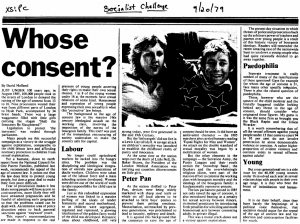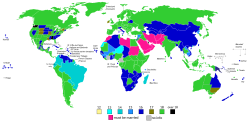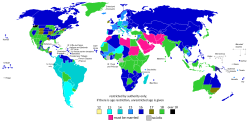One of our staff members is contributing considerably to a News Archiving service at Mu. Any well educated (Masters, PhD or above) users who wish to make comments on news sites, please contact Jim Burton directly rather than using this list, and we can work on maximising view count.
Age of Consent

The Age of Consent is an arbitrary age at which a person is considered legally capable of consenting to sex within a given country (or with a citizen of that country anywhere in the world, if it has extraterritorial jurisdiction laws). Where a country's age of consent laws for sexual activity treat people convicted of those offences with the same severity as criminal rape, the law is often referred to as statutory rape.
This definition highlights several important factors which go into determining the age of consent. To begin with, it is arbitrary. In other words, the age is not chosen based on an empirical and measurable personal quality which relates to the capacity for consent, but rather, it is chosen as a compromise number based largely on political, social, psychological and judicial precedent factors in a legislative process often only marginally related to the actual capabilities of the individuals to which it is applied. This is seen as necessary when such an age must be determined, despite the fact that no two individuals mature at precisely the same rate.
Another important factor is that of jurisdiction. A jurisdiction represents the abstract collection of individuals over whom a certain legal institution has authority. As a direct consequence of the arbitrariness of the age of consent, the actual number varies from jurisdiction to jurisdiction. An individual who may be capable of legally consenting in one area may, simply by crossing a border, find that his consent is no longer valid.
Current debate

Recent years have seen a general trend towards decriminalizing, or at least destigmatizing sexual acts which carry a burden of moral guilt, but no substantiated evidence of harm. HIV nondisclosure is one such example,[1] and similar trends have been seen in sex-work advocacy, SOL Reform and sex education, the latter leading to accusations of so-called grooming. It appears there is an evidentiary base for making similar arguments with respect to voluntary minor-adult sex, although critical mass has not yet been reached for such substantial moves.
The following positions on the age of consent are not strict categories:
- The authoritarian position holds that current age of consent laws are set at inadequately low ages, and should be revised, in some cases as high as 21 or 25. This position is sometimes based more on antipathy towards sexual behavior among young people rather than extensive authoritarian protectionism.
- The conservative position (not necessarily right-leaning conservatism) holds that current age of consent laws are appropriate and should be enforced as they stand. This would segue into a globalist conservative position holding that jurisdictions with lower ages of consent should bring themselves up to parity with jurisdictions with higher ones.
- The libertarian or reformist position holds that while at least in the cultures concerned, age of consent in itself is a valid and desirable concept, the current numbers are too high or unrealistic and should be revised downwards. This might take the form of an elective system whereby a minor chooses to emancipate themselves in various areas, including consent to physical relationships.
- The replacement position holds that the concept of age of consent is not valid for its purported purpose and should be replaced with another system of determining capability to legally consent. The replacements most typically take the form of marriage, or some type of preparation or education, examination or empirically graded "test" to determine whether an individual is "ready", sometimes coupled with licensing schemes.
- The repeal position holds that the concept of age of consent should be eliminated completely.
Poll in Britain
On November 16, 2003 Channel 4 broadcast a program; "Sex Before 16: Why the Law is Failing" and afterwards conducted a phone poll of its viewers in the United Kingdom.
Of the 3366 respondents to the four options;
- 34% thought the age of consent should be reduced to 14
- 35% thought it should stay at 16
- 13% thought it should be raised to 18
- 18% thought it should be abolished[2]
Whilst this would suggest that there is more potential to lower the age, the topic remains controversial, and the Channel 4 viewer sample was questionably left-libertarian biased.
Popular opinion
It is generally hard to gauge popular opinion on this topic, due to a dearth of reliable polling. Debate.org conducted a poll, in which over 2/3rds supported reform, with many radical proposals. Between 2008 and some unknown point, "misterpoll.com" published a large list of questions related to the Age of Consent. Their respondents, mainly men, answered mostly between the years of 2008 and 2011. Over half did not support the idea of an age of consent, and 86% agreed that minors should be able to perform in a strip tease. It is unclear how representative this sample is.[3]
-
Debate.org
Is support for high ages of consent associated with poor intelligence?
Limited studies suggest that support for maintaining a high age is associated with lesser intelligence.[4]
The UN
A 2023 controversy arose on social media[5] following the publication of new legal principles problematizing the idea that adolescents are inherently unable to consent, including to sex. American conservatives reacted by circulating the theory that such opinions represent an attempt to "soften up" the public prior to the release of supposedly "damning" information concerning Jeffrey Epstein's high-profile visitors.
Ages of consent around the world


- For a short analysis of the historical context behind AoC laws and their interpretation, see our article on Consent. Given the constantly changing nature of AoC laws, an up-to-date list can not be provided here. See Wikipedia.
Some interesting examples of low ages of consent include Japan[6] (who appear to be raising it[7] under Western pressure), Brazil and Peru. The case of Brazil is described at length, in the document, Sexuality, the age of consent and the Brazilian law, which describes among other things, proposals in the 10s, to reduce the age from 14 to 12.[8] India has faced similar calls, based upon the sheer number of adolescents engaged in illegal sexual activity.[9]
While the federal age of consent in Mexico is 15, state laws often override federal law, and state ages of consent vary from 12 to 15. The state law of Nayarit specifies that a person must have reached puberty in order to consent with sex. However, the state age of consent is not unrestricted and factors such as age difference and hierarchical subordination of the younger partner may play a role.
The age of consent in the Philippines was 12 until 2022, when it was raised to 16.[10]
In the late 70s, New Jersey lowered its age of consent to 13, amid sweeping law reforms. It was raised soon after, but only because of public outcry, not any increase in sexual victimization.[11] A 2018 act reduced the age of consent in Malta, albeit to fall in line with the rest of Europe at 16. The same act also reduced the voting age to 16.[12]
The case of the Netherlands
Much discussion has been devoted to the age of consent in the Netherlands. According to a law passed in 1989 (after a much longer period of unofficial liberalization[13]), even though the age of consent was set at 16, sex between an adult and a young person between 12 and 16 was not an offence if the young person consented to the contact. Prosecutions for coercive sex could be sought by the young person or his/her parents.
The law which stirred much discussion (see Schuijer 1991, 1993, 1995, Faust 1995) and praised as positive for adolescent sexuality (Levine 2002, 89) was later repealed in 2002 by a very rare unanimous vote in the Dutch parliament (Hekma 2004).
Initiatives to lower the UK Age of Consent
At around the turn of the century, a poll of 12-16 year old British girls suggested that the age should be lowered to 12. Activists such as Peter Tatchell have long sought to lower the age, arguing that this would be more in line with the lived experiences of young people. In 2013, a leading public health official called for a moderate reduction, but leaders only appeared to be amenable to a close in age exemption and not a "blanket reduction". John Ashton advocated the moderate reduction to 15, but was shut out of the public debate.[14][15]
Earlier (in the 70s and 80s), the British National Council for One Parent Families (image inset) had even advocated for abolition, being joined by various Gay and MAP groups. In 1979, close to the peak of liberal attitudes on this topic, even the Home Office argued that the age of consent be lowered from 16 to 14, calling for a dramatic reduction in statutory punishments for consensual sex with girls as young as 12 in an internal research study obtained by the Guardian.[16]
Reasons for increasing the Age of Consent
As explained by Wikipedia, ages of consent were often set around the age of puberty or marriage until the reforms of the 19th and 20th Centuries, and were very much open to interpretation. In postindustrial Victorian England, changing attitudes around the institution of childhood and prologation of education, aided by Christian/Feminist Social Purity campaigners, moral entrepreneurs and journalists such as W. T. Stead, - led to changes that spread the world over.
It is important to note that ages of consent were not initially raised and enforced for the same reasons we presently uphold them:
- “Sexual consent is now understood by many – although not all – as a marker of when girls (and boys) are ‘allowed’ or likely to have sexual intercourse as much as a signifier of their capacity to consent. For the Victorians, sexual consent was certainly not a recommended or permitted age of sexual activity. The 1885 law on sexual consent meant, to cite the 1908 Royal Commissioners on the Care and Control of the Feeble-Minded, that ‘[t]he power of consenting to unlawful defilement … has been taken from girls under sixteen’. This wording is significant: the right to consent was ‘taken away’ from girls under the age of consent, rather than given to those above it. Few commentators approved of sexual intercourse outside of marriage, which was expected to occur in the mid-20s rather than at the legal age of marriage (14 for boys and 12 for girls) or age of sexual consent.”[17] [our emphasis]
Oftentimes, when opposition to British-style increased age of consent statutes was voiced during the empire's fall, it took the form of an anti-imperialist argument.[18]
See also
- Consent - Explores the concept and links to specific articles on Newgon.
- Debate Guide: Problems with the Age of Consent
- Mature Minor
- Age of majority
External links
- Age of Consent Laws - Summary article by Stephen Robertson
- The age of consent... for what, exactly? - Heather Corinna, for Scarleteen.
- AoC Reform - Wikipedia
- The definitive list - Ages of consent on Wikipedia.
- Reading list - published on BC
- Worldwide Ages of Consent - a table presumably dated from around 2012
References and further reading
- Baker, C. (1983) "The Age of Consent Controversy: Age and Gender As Social Practice." Australian & New Zealand Journal of Sociology 19(1): 96-112.
- Baurmann, M. (2005) "Sexuality, Adolescence and the Criminal Law: The Perspective of Criminology." Journal of Psychology & Human Sexuality 16(2/3): 71-88.
- Böllinger, L. (2005) "Adolescence, Sexual Aggression and the Criminal Law." Journal of Psychology & Human Sexuality 16(2/3): 89-104.
- Brongersma, E. (1980) "The meaning of 'indecency' with respect to moral offences involving children." British Journal of Criminology 20(1): 20-34.
- Brongersma, E. (1988) "A Defence of Sexual Liberty for All Age Groups." Howard Journal of Criminal Justice 27(1): 32-43.
- Brown, M. (1996) "The Age of Consent: The Parliamentary Campaign in the UK to Lower the Age of Consent for Homosexual Acts." Journal of Legislative Studies 2(2): 1-7.
- Bullough, V. L. (2005) "Age of Consent: A Historical Overview." Journal of Psychology & Human Sexuality 16(2/3): 25-42.
- Cocca, C. E. (2004) Jailbait: The Politics of Statutory Rape Laws in the United States. Albany, NY: State University of New York Press.
- Coleman, E. Letter to EU President Prodi (2001)
- Ellis, S. J. and C. Kitzinger (2002) "Denying equality: An analysis of arguments against lowering the age of consent for sex between men." Journal of Community & Applied Social Psychology 12(3): 167-180.
- Faust, B. (1995) "Child sexuality and age of consent laws: The Netherlands model." Australasian Gay and Lesbian Law Journal, 5, pp. 78-85.
- Graupner, H. (1999) "Love versus abuse: crossgenerational sexual relations of minors: a gay rights issue?" Journal of Homosexuality 37(4): 23-56.
- Graupner, H. (2000) "Sexual consent: The criminal law in Europe and overseas." Archives of Sexual Behavior 29(5): 415-461.
- Graupner, H. (2005) "The 17-Year-Old Child: An Absurdity of the Late 20th Century." Journal of Psychology & Human Sexuality 16(2/3): 7-24. (.pdf file)
- Hekma, G. (2004) "Queer: The Dutch case." GLQ: A Journal of Gay and Lesbian Studies 10(2): 276-280.
- Haeberle, E.J. (June 27, 2001) A Dangerous New Definition of Childhood: Letter to the President of the European Commission, Romano Prodi
- Hofmeister, L. (2005) "14 to 18 Year Olds as 'Children' by Law? Reflections on Developments in National European Law." Journal of Psychology & Human Sexuality 16(2/3): 63-70.
- Killias, M. (1990) "The Historic Origins of Penal Statutes Concerning Sexual Activities Involving Children and Adolescents." Journal of Homosexuality 20 (1/2): 41-46.
- Leahy, T. (1996). "Sex and the age of consent: the ethical issues." Social Analysis 39(April): 27-55.
- Levine, J. (2002). Harmful to Minors: The Perils of Protecting Children From Sex. Mineapolis: University of Minnesota Press.
- Maplestone, P. and R. Roberts (2002) "Young gay men and the age of consent in New South Wales." Word is Out 3(June): 13-21. (.pdf file)
- Mawby, R. I. (1979) "Policing the Age of Consent." Journal of Adolescence 2(1): 41-49.
- Powell, D. E. B. (1994) "Homosexuality and Age of Consent." Lancet 343(8898): 674.
- Rind, B., P. Tromovitch & R. Bauserman (2001) "The validity and appropriateness of methods, analyses, and conclusions in Rind et al. (1998): A rebuttal of victimological critique from Ondersma et al. (2001) and Dallam et al. (2001)." Psychological Bulletin 127: 734-758.
- Robertson, S. (2002) "Age of consent law and the making of modern childhood in New York City, 1886-1921." Journal of Social History 35(4): 781-798.
- Thomson, R. (2004) ‘An Adult Thing?’ Young People’s Perspectives on the Heterosexual Age of Consent. Sexualities, 7(2), 133-149.
- Schuijer, J. (1991) "Tolerance at Arm's Length: The Dutch Experience." Journal of Homosexuality 20 (1/2): 199-229.
- Schuijer, J. (1993) "The Netherlands Changes its Age Of Consent Law." Paidika: The Journal of Paedophilia 3(1): 13-17.
- Schuijer, J. (1995) "Recent Legal Developments in the Netherlands." Paidika: The Journal of Paedophilia 3(4): 64-71.
- Waites, Matthew. 2005 The Age of Consent: Young People, Sexuality and Citizenship (2005). Find at Internet Archive and annas-archive, or through Research Resources - Information Freedom Companions if inaccessible.
- Weber, A. (2001) "Europeanwide Criminalization of Juvenile Sexuality up to 18." EuroLetter 91: 6-8.
- Weis, D. and V. L. Bullough (2005) "Adolescent American Sex." Journal of Psychology & Human Sexuality 16(2/3): 43-54
References
- ↑ HIV transmission laws are being described as unscientific
- ↑ https://web.archive.org/web/20031124074934/http://www.channel4.com/health/microsites/A/adultat14/consent/aoc_vote.shtml
- ↑ MisterPoll Results and Misterpoll Archived Results
- ↑ Bronski study article on intelligence
- ↑ New UN-backed legal recommendations normalize sex with minors, outraged critics say
- ↑ AoC.net - Japan
- ↑ Japan OKs bill to reform sexual offense charge, raise age of consent
- ↑ Sexuality, the age of consent and the Brazilian law, by Yure
- ↑ Age of consent: Why is consensual teen sex a crime in India?
- ↑ PH raises age of sexual consent from 12 to 16. CNN Philippines. March 7, 2022.
- ↑ Waldron in NYT: A Decade in the Making, the State's First Criminal Code Takes Effect Next Month
- ↑ The Age Of Consent In Malta Has Been Lowered - J. Cilia for Lovin Malta
- ↑ Dutch Policemen who understood pederasty - Brongersma
- ↑ John Ashton, 2013
- ↑ No 10 rejects call to lower age of consent
- ↑ Whitehall study wanted age of consent lowered to 14 and sentences for sex cut
- ↑ The legacy of 1885: girls and the age of sexual consent, by Victoria Bates
- ↑ Sumita Mukherjee, ‘Using the Legislative Assembly for Social Reform: The Sarda Act 1929’, South Asia Research, 26, 3, (November 2006). There were also political and nationalist concerns for reformers within the Legislative Assembly. In the 1890s, the nationalist leader Bal Gandadhar Tilak had been opposed to the Age of Consent Bill because he did not want India’s advancement to be dependent upon British help. Now that Indians were more involved and represented in the debating chamber, they could argue that their advancement was no longer dependent upon the British.